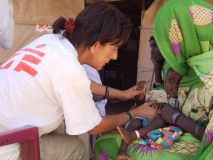Aid workers coming under increasing attacks in Darfur
By Steve Bloomfield
July 7, 2007 (LONDON) — Aid workers in Sudan’s Darfur region are coming under increasingly frequent and savage attack, with June among the worst months recorded, according to a confidential security report compiled by an international charity.
 Thirty serious incidents took place in the last month alone – up from an average of 10 per month one year ago – as armed bandits and militia groups launched daily violent attacks.
Thirty serious incidents took place in the last month alone – up from an average of 10 per month one year ago – as armed bandits and militia groups launched daily violent attacks.
The report, by a charity working in Darfur, which cannot be identified for safety reasons, reveals that 28 people working for international aid agencies were abducted, while more than 35 vehicles were either hijacked, shot at or stolen. Two people were shot dead and five were injured during attacks. In one of the most daring incidents, a convoy of 37 UN vehicles was ambushed near Kebkabiya in North Darfur. Two of the vehicles were hit by bullets and one of the drivers was injured . Three days later, 15 armed men forced their way into an aid agency compound, assaulting a guard and stealing a vehicle.
Dawn Blalock, spokeswoman in Sudan for the UN’s humanitarian co-ordination body, OCHA, said: “Security has always been an issue but what has changed in the last year is that humanitarians are now direct targets. It is now a daily occurrence.”
More than 2.5 million Darfuris have been forced to flee their homes and live in squalid camps, while a further 1.5 million are also dependent on humanitarian aid. In a region of just seven million people, the majority are now relying on aid agencies.
Despite the signing of the Darfur peace agreement in May 2006, the violence has still increased. Almost 500,000 people have fled since the peace deal. Many of the camps are now at full capacity but people are still arriving every day.
The very nature of the peace agreement may have encouraged some groups to take up arms. By rewarding armed groups with political power if they sign the agreement, one diplomat warned it was encouraging the rise in insecurity. “Take your guns, grab some NGO vehicles, seize a small town, then declare you want peace,” he said.
At the time of the peace agreement there were three major rebel groups in Darfur. But just one group, a faction of the Sudan Liberation Army (SLA), signed the agreement. Since then all three groups have splintered. There are now believed to be anywhere between 15 and 22 different armed groups in Darfur. Ms Blalock said the fragmentation of the rebel groups had led to a deterioration in the security situation. “Before, we dealt with one clear interlocutor. If we were delivering aid we made one phone call to one rebel group. That is no longer the case because there are so many different groups,” she said.
It has become more difficult for aid agencies to know which groups are in control of which areas. Insecurity has increased costs – much of the aid delivered now has to come by air because the roads are too dangerous.
There are around 14,000 people working in Darfur for more than 80 international aid agencies. A spokesman for Medecins Sans Frontieres, which has more than 2,000 staff on the ground in Darfur, said security problems were preventing them from providing the standard of medical aid that is required.
“It is very difficult for aid workers to move outside the camps, which means it is hard to do exploratory missions to areas where we think there is a need. The situation is very bad and is not getting better,” he said.
(The Independent)
